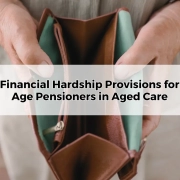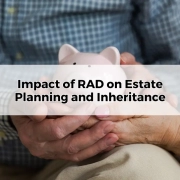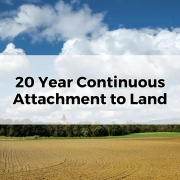Estate Planning Tools for Aged Care Funding
Table of Contents
ToggleEstate planning is often viewed as a distant concern, reserved for later stages of life. However, when aged care enters the equation, estate planning shifts from a future strategy to an urgent necessity. In Australia, aged care costs can place significant pressure on financial resources, making it essential to develop a well-structured estate plan that safeguards assets, manages liabilities, and optimises care funding.
Transitioning to aged care can be an emotional and financial challenge. Whether you are planning for yourself or assisting a loved one, understanding the tools and strategies available can ease the process and ensure peace of mind. Estate planning not only protects hard-earned wealth but also guarantees that funds are allocated efficiently to meet aged care needs while preserving the legacy you wish to leave behind.
The Importance of Estate Planning for Aged Care Costs
Aged care costs in Australia can be significant, often running into hundreds of thousands of dollars over time. These costs typically include accommodation fees, daily care expenses, and means-tested care fees, which are determined by an individual’s income and assets. Without proactive planning, these expenses can rapidly erode family wealth and impact the financial security of future generations.
Estate planning addresses these challenges by implementing tools that balance aged care funding with long-term financial goals. A structured plan ensures that assets are preserved, unnecessary fees are minimised, and tax efficiencies are leveraged. It also aligns family expectations and provides clarity on how care will be funded, alleviating potential conflicts or stress during a challenging time.
For families, estate planning serves as a safeguard, ensuring that loved ones receive the care they need without compromising their lifestyle or inheritance. By proactively addressing aged care costs, individuals can secure a comfortable transition while protecting the financial wellbeing of their estate.
Aged Care Funding
Before exploring estate planning tools, it is essential to understand the aged care funding system. Aged care is subsidised by the government but often requires significant out-of-pocket contributions. Funding is generally divided into three key cost components:
- Daily Care Fees: These cover basic living costs such as meals, cleaning, and personal care. The amount is capped but depends on individual circumstances.
- Means-Tested Care Fees: Calculated based on income and assets, this fee can vary significantly and may increase the overall cost of care.
- Accommodation Costs: These can be paid as a Refundable Accommodation Deposit (RAD), Daily Accommodation Payment (DAP), or a combination of both.
Government subsidies can help to alleviate some of the financial burden; however, they are means-tested. This means that individuals with higher income or assets may face greater costs. Estate planning ensures that financial resources are structured to minimise these fees while maintaining compliance with government requirements.
Understanding how aged care funding works allows individuals to make informed decisions, ensuring that care costs are optimised while assets remain protected for future generations.
Wills: The Foundation of Estate Planning
A Will is the fundamental building block of any estate plan. It outlines how assets are to be distributed after death, ensuring that your wishes are respected and your estate is managed efficiently. When aged care funding becomes a priority, maintaining a current and valid Will is essential to protect assets and ensure the seamless allocation of resources.
Entering aged care is often accompanied by significant financial adjustments, such as selling the family home or reallocating investments. A carefully drafted Will can help align these changes with your long-term estate planning goals. It provides clarity on the distribution of funds to cover aged care costs while safeguarding remaining assets for beneficiaries.
Regularly reviewing your Will during key life events, such as entering aged care, prevents delays and disputes that may arise when managing an estate. By keeping your Will up to date, you can ensure that aged care funding is optimised, and your financial legacy remains intact.
Powers of Attorney and Guardianship Arrangements
Powers of Attorney (PoA) and guardianship arrangements are critical components of estate planning, especially when cognitive or physical decline impacts decision-making capabilities. These legal tools empower trusted individuals to act on your behalf, ensuring your financial and personal interests are protected.
A Financial Power of Attorney allows the nominated person to manage your assets, investments, and financial affairs. This includes making decisions about how to fund aged care, such as selling property, accessing superannuation, or adjusting investment portfolios. Without a Financial PoA, families may face delays and legal challenges when accessing funds for care.
A Medical Power of Attorney or guardianship arrangement ensures that healthcare decisions align with your preferences. This includes choosing care facilities, approving medical treatments, and managing personal welfare.
Implementing these tools provides peace of mind that trusted individuals will act in your best interests, particularly when aged care decisions must be made promptly and efficiently.
Testamentary Trusts: A Flexible Estate Planning Tool
A testamentary trust is an estate planning tool that offers asset protection, tax benefits, and flexibility in distributing funds. Established through a Will, a testamentary trust allows assets to be managed and allocated according to specific terms and conditions.
For aged care funding, testamentary trusts provide a structured way to manage financial resources. By distributing assets through the trust, families can minimise the impact of Centrelink means testing, as assets held within certain trusts may not be fully assessed. This can optimise eligibility for government subsidies while preserving wealth for future generations.
Testamentary trusts also offer tax advantages. Income distributed to beneficiaries can be taxed at marginal rates, which may reduce the overall tax burden. This flexibility makes testamentary trusts a valuable strategy for balancing aged care funding with estate preservation.
Gifting Strategies and Their Impact on Aged Care Costs
Gifting assets to family members or trusts can be an effective strategy for reducing means-tested care fees. However, Australian aged care rules impose strict limits on gifting to prevent deliberate asset depletion.
Under current rules, gifts exceeding $10,000 per financial year (or $30,000 over five years) are classified as “deprived assets.” These amounts are still counted towards Centrelink means tests for five years from the date of gifting, potentially increasing aged care fees.
While gifting can help reduce assessable assets, it requires careful planning to ensure compliance with legislation. Improper gifting may result in unintended financial consequences, such as loss of government benefits or higher aged care costs. Estate planning specialists can assess gifting strategies to balance aged care funding objectives with legal and financial requirements.
Superannuation
Superannuation is a cornerstone of retirement planning and can play a significant role in funding aged care costs. Super funds provide tax-effective income streams that can be directed towards ongoing care expenses, ensuring financial stability throughout the aged care journey.
A key consideration is ensuring that superannuation benefits are distributed according to your wishes. Binding Death Benefit Nominations allow you to specify beneficiaries who will receive your superannuation proceeds. This prevents disputes and ensures funds are allocated appropriately.
Strategically integrating superannuation into your estate plan minimises tax liabilities and maximises financial efficiency. Proper management of superannuation ensures that funds remain available to meet aged care costs while protecting wealth for beneficiaries.
Conclusion
Estate planning for aged care funding is not just about preparing for the future—it is about taking control of the present. By utilising tools such as Wills, Powers of Attorney, trusts, and superannuation strategies, individuals can optimise their financial resources to meet aged care needs while protecting their legacy.
A proactive approach ensures that assets are preserved, care costs are minimised, and financial stability is maintained. Navigating the complexities of aged care requires careful planning and professional guidance to achieve the best outcomes. By implementing a comprehensive estate plan, families can secure the care they need while safeguarding their wealth for generations to come.









